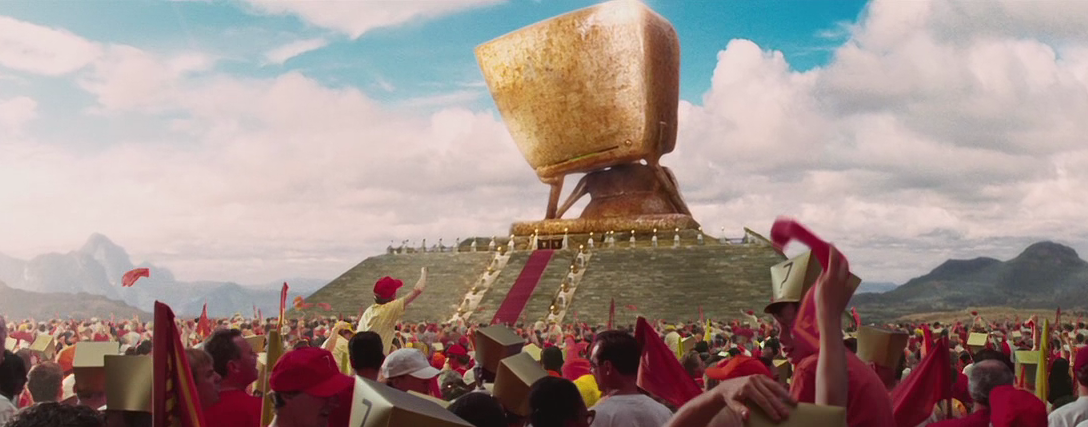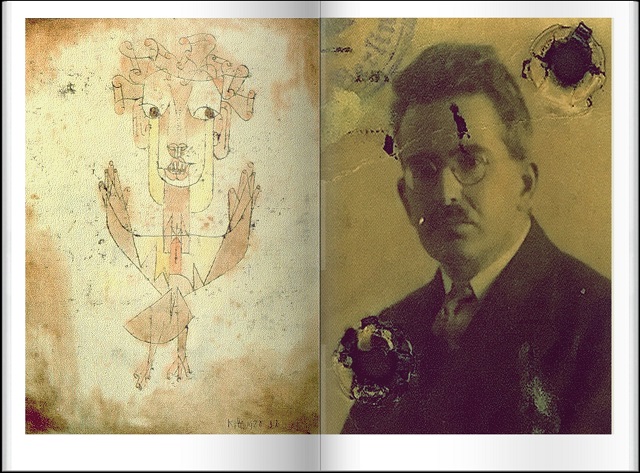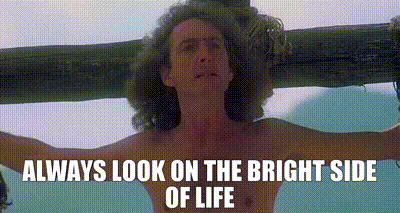 |
| The Hitchhiker's Guide to the Galaxy (2005), moments after the answer to everything is revealed. |
What is the "Meaning of Life?"
Philosophers over the years have tried to take up the question of what the "meaning of life" is, and most have thrown in the towel to try and answer that. Its origins can be traced back to 1834, where Diogenes Teufelsdröckh, a character within Thomas Carlyle's novel Sartor Resartus. In it, Diogenes tries to answer what the meaning of life is, and comes to an interesting conclusion.
 |
| Thomas Carlyle; Sartor Resartus |
"The whole external Universe and what it holds is but Clothing, and the essence of all Science lies in the PHILOSOPHY OF CLOTHES."
What exactly is the philosophy of clothes? It is the belief that all men have thought, dreamed, been, and done. In a way it is giving layers onto how we live our lives, much like the clothes we bear onto ourselves. We find ourselves searching for purpose in life. When we cannot seem to find purpose, or when life gives us too many hardships, it can be very easy for this question to arise in our minds.
 |
| Kieran Setiya; Life is Hard |
"....it's a question that we ask in times of emptiness or anguish, when life feels meaningless or absurd."
Notice how Setiya uses the word absurd. It is a word used to describe wildly unreasonable, illogical, or inappropriate. But is this truly a question that is absurd? We remind ourselves of personal goals and aspirations enough to encourage us again, then we move back to our normal lives. And while we can often find our individual purpose, the overall question is focused more on general life as opposed to individual life. How absurd is it to ask the meaning of our existence, and what our true goal is as a species?
Absurdity
When looking at common views of life itself, there are mainly two beliefs people can have.
1.) Nihilism. This is the belief that nothing in life matters. If we are all going to die in this world what is the point in caring for its future? Why build up a life for the last generation if it's all going to disappear anyway? This is absurdism in its true self. To live a life of negativity is merely absurd, as you not only bring harm to yourself but harm to the others around you.
2.) Ignorance. Blind optimism is often another form of absurdism, given that it is ridiculous not to think on the world around us. When we begin to view the world around us in a nonstop positive light, we do not expose ourselves to deep intellectual questions. Instead, we always look on the bright side of life for events we should probably be concerned about. Or not, in Eric Idle's case in Life of Brian.
Other Means to Find the Meaning of Life
There are two more big ways people have often tried finding the meaning of life, one of which is through Religion. Many people have seen religion, as Setiya puts it, as the "total reaction upon life." Christianity, for example, holds the concept of Heaven and Hell. Heaven holds the purest of souls, those who have done nothing but commit total good in their life. Where as Hell holds the most corrupt of souls, those that are evil and a scourge to human life. This reinforces the concept of rewarding people for doing good things, and punishing people for doing bad things. So the overall meaning of life therefore would be to commit to only good things in life, right? That is what a perfect world would be, but realistically that is not how the world works. Many bad people still live through life perfectly fine, while good people often suffer through unnecessary challenges. That does not mean one should not do good things because they will not be rewarded, but one should not expect to be rewarded for their good efforts.
However, there are often world events that truly shape our individual purpose. Setiya talks of a Frankfurt School philosopher, Walter Benjamin, and his interpretation of the world in his essay "On the Concept of History." In it, he talks of an angel and describes "a storm [that] is blowing [that] propels him into the future."
 |
| The Angel of History from "On the Concept of History" (left) & Walter Benjamin (right) |
The storm is an interpretation for world events in life's overall span. Many of the world events are not individual occurrences, but rather one giant catastrophe that piles upon itself continually. It can be seen as progress, and how far we have come as to not repeat the same events over and over. At the time of Setiya's writings, climate change was a huge concern (and still is). Its presence has given us time to truly think about how we want to keep this planet healthy and clean, and not ruin it with our lack of recycling and staining this precious Earth. In this way, does the meaning of life boil down to keeping this planet safe from catastrophic events? That still does not answer the meaning of life, as that is still only a goal, not an explanation. As Setiya puts it in
Life is Hard:
"Our efforts will shape the facts that tell us how to feel."
Life's True Meaning
Life's true meaning is simply a question that is far too broad to answer. It is a question we must ask our individual selves, and determine from there. Whether that be through our philosophy of living through the world naturally, by giving into nihilistic tendencies and living a selfish life with ignorance towards the future, by finding purpose through religion and faith, or by finding an active cause to keep this earth safe, we all eventually find our meaning to live our very lives. Ultimately, one cannot live a life in a corrupted and dying world, which is important we try to maintain a safe and secure world not just for our future, but for others to truly experience the beauty of life. Our efforts pave the way for many more great minds.
 |
| Hitchhiker's Guide to the Galaxy (2005), a fitting quote to end off this post. |






Although we've noted Wm James's equivocation about whether life is worth living--"maybe"-- he didn't actually "throw in the towel" on the question of life's general meaning and value himself. In his essay "What Makes a Life Significant," he writes:
ReplyDelete“The solid meaning of life is always the same eternal thing—the marriage, namely, of some unhabitual ideal, however special, with some fidelity, courage, and endurance; with some man's or woman's pains."
To paraphrase: meaning arises when you find some ideal for which you are prepared to work, struggle, and endure. And then, it's solid. Not absurd... but living without ideals or meaningful work to pursue them might be.
Not sure the "common view" reduces to a choice between nihilism and ignorance. Seems like plenty of common folk lead lives of meaningful engagement with family, friends, work, travel, education, ideals etc.
"one cannot live a life in a corrupted and dying world"-- I don't think I want to concede this, just yet. We'll see. But not soon, I hope.
I do like what Christopher Hitchens said about this:
"A life that partakes even a little of friendship, love, irony, humor, parenthood, literature, and music, and the chance to take part in battles for the liberation of others cannot be called 'meaningless' except if the person living it is also an existentialist and elects to call it so. It could be that all existence is a pointless joke, but it is not in fact possible to live one's everyday life as if this were so."